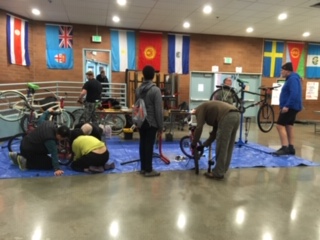Why Bikes?
/This is a question I have to ask myself a lot working here. As someone who considers myself still a veritable outsider to the bike community in Portland, and as someone with a larger personal mission in the work I do beyond transportation justice, I am constantly asking myself what role bikes play in the social, political, environmental, and economic landscapes I live in.
What needs does a bike meet? Who are bikes for? Why are bikes an icon of transportation and environmental justice? What does it mean to be a bike nonprofit? Who is our nonprofit serving? How are we being of service?
Image is of B4HPDX volunteers helping to fix bikes at the 3rd Winter Fix-It-Fair. Picture is courtesy of Fix-It-Fair organizer Lauren from Repair PDX.
I remember having some conversations with our Program Director Andrew about our mission statement. When I was first introduced to B4H, I remember it being something along the lines of, “Everyone Deserves a Bike.” Not a very concrete thing to build an organization around. There wasn’t much explanation as to why everyone deserves a bike, or how bikes are meeting any primary human right such as access to food, clean running water, safe housing, or medical care. It wasn’t until Andrew started talking about transportation justice and referred me to the work of advocates like Dr. Adonia Lugo [https://microcosmpublishing.com/catalog/artist/adonia_lugo_phd], that it finally clicked.
In a society where having a home, food, clean running water, education, and health-care are seen as privileges, getting to these resources becomes a barrier in and of itself. Generally, one has to have a source of income to afford these things, so getting to work becomes a necessity. For those who have barriers to employment (such as not having a car, which is required for many occupations) or who are underemployed/underpaid, then getting to resources such as a food-pantry, shelter, sleeping-spot, or free clinic becomes another serious concern.
For some reason, despite having had times in my life where I struggled significantly with access to transportation to do all the things I just mentioned above, it never occurred to me that affordable transportation is also a primary human right we’ve made a privilege. For folks with disabilities, the need for access to personal and adaptive transportation is even more stark [https://nextcity.org/daily/entry/portland-adaptive-bikeshare].
But then what does it mean to be on what is considered a relatively slower mode of transportation in a car-paced society? That, for me at least, is a more difficult question to answer. I won’t lie, commuting on a bike for some of us is a pain and a half. That pain is exponential the further away you live from where you work or get resources. If you’re like me, you can’t really do hills or inclines on your bike. I will unapologetically get off my bike and walk for part of my commute if it involves going up something. If for no other reason than to save myself a fall-down-on-the-sidewalk-gasping-fit that would inevitably come if I attempted a climb on my bike. A slow and long commute then means everything else becomes a slower longer process.
Image of downtown Portland at twilight, taken from a bus going across a bridge. Photo taken by the author of this post.
I can’t be as productive as I’m used to being when I have the money for bus fare and the ability to show up earlier or stay later at work. I can’t do homework or answer calls, texts, or emails when I’m on my bike, either, so everything kind of has to wait until I get where I need to be. It’s an odd and at times very frustrating thing and it strangely supports another case for bikes over cars. You have to admit you’re human and accept your pace - even if that pace means less productivity and subsequently less money. It’s all an inescapable cycle, right? In this case, both figuratively and literally.
Since my conversations with Andrew, our mission statement has become tighter and more focused. We touch on our goals of environmentalism and transportation justice, “Our mission is to substantially increase public access to affordable and safe bicycles while empowering self-sufficiency in bicycle maintenance and commute,” and in some ways it provides a few answers to the very large questions I posed at the beginning of this post. But ultimately, the role bikes play in the world at large and the role they play in our individual lives is ever evolving and our real mission, at the end of the day, is to evolve with it.
Image of a purple road-bike with rack in front of a long display and work-bench that is hosting books, t-shirts, and various bike accessories/parts/tools. Image was taken by the author of this post at our SE Powell bike shop.



